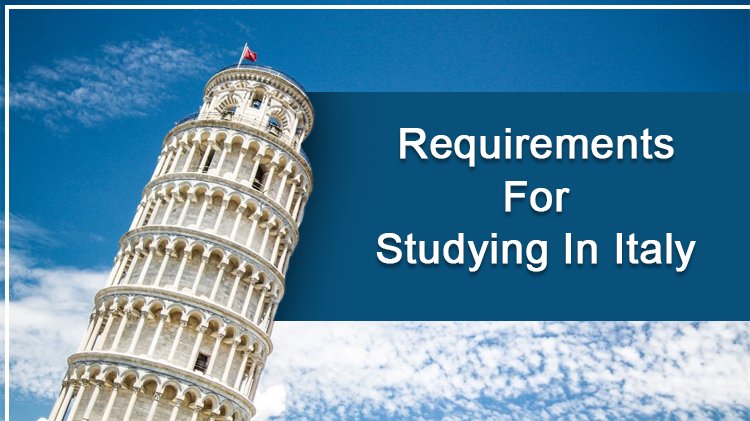Requirements For Studying In Italy
Requirements for studying in Italy vary depending on what type of student you are. If you are a full-time student, you will need a valid student visa. There are many Italian student visa options for international students who want to study in Italy.

There are a few entry requirements that you should be aware of while applying to study for a bachelor's, master's, or PhD at an Italian university. To make the ideal application for an Italian university, just follow these 6 simple steps!
Bachelor's Degree
You must have successfully finished upper secondary studies, had a valid school leaving certificate, and be eligible for higher education studies in your home country in order to be admitted to an Italian institution to pursue a bachelor's degree. Remember that many bachelor's degree programmes in Italy are only available in Italian and that you might need to demonstrate your language proficiency in order to get admitted to your programme of choice by passing a recognized language exam.
Master's Studies
You must hold a suitable bachelor's degree or an equivalent degree to be eligible to study for a master's degree at an Italian university. At the master's level, many Italian universities provide a greater variety of English-language programmes. A recognized English language test, such as the TOEFL® or IELTS, can be used to demonstrate your proficiency if your prior studies were not conducted in English. You should check with your institution's foreign office to see what language exam results are accepted.
When applying for the programme of your choosing, you might need to submit any or all of the following materials as part of the entry criteria to study abroad in Italy.
- A passport or EU identity card, which serve as proofs of identity;
- A transcript of your prior academic work;
- An application to the university;
- Recommendation letter;
- Personal Statement, as well as
- Evidence of language ability (English or Italian, depending on the program).
You might also need to produce a certified translation of your documents into Italian, depending on your institution and the language they were written in. Since different programmes and institutions may have varying entry requirements, it is always a good idea to double-check any unique application requirements with your institution!
Read Also: How To Get Student Visa For Italy
PhD Programs
You must have completed a relevant master's degree programme or diploma to be eligible for admission to a PhD programme at an Italian university. Additionally, several Italian universities demanded that applicants submit a research project.
Things to Consider
- Always confirm the entry requirements and minimum grade requirements with the university before applying to study in Italy.
- Higher education schools may demand particular admission tests for some competitive academic programmes (such as health and medicine, veterinary medicine, education, and architecture).
- It's time to submit your application once you've verified that you meet the exact entry requirements for your programme. Learn more about the application procedure for studying at an Italian university by reading the information below.
How to Apply
Depending on your place of origin and current residency, there are various application methods for applying to Italian universities, much like the process for obtaining student visas in Italy.
If you have a current and valid "permesso di soggiorno" and are a citizen of the EU or a non-EU country, you should apply directly to your Italian university.
You should send a pre-application request to the Italian Embassy or Consulate in your country of residence if you're a non-EU national living abroad, stating the institution and programme you're applying to. Your paperwork will be forwarded to the institution by the officials, and you should check with your institution to find out how and when the results will be posted.
Italy has gained popularity among international students in recent years as more of them travel there to benefit from the country's strong educational standards and range of offered academic programmes. There are a few things you should be aware of if you intend to travel to the stunning European country. So, as usual, we are here to help you! To learn more about the requirements for studying abroad in Italy, keep reading.
Documents needed to complete the admissions application
You must fulfil specific conditions in order to enroll in any Italian university. A few key documents must be submitted with your application. These documents are evidence of your nationality, identity, and qualifications. Depending on your academic level and course of study, universities may request documentation. However, foreign students must have the following documents in order to study in Italy:
- Application Form: Before the deadline, the application form must be completed and submitted. While some colleges only accept paper applications, others accept both.
- Academic Documents: Copies of all credentials from the 10th, 12th, and graduate levels (if applicable), as well as the student's mark sheets with any backlogs. If you're in your last year of your bachelor's programme, you can submit the final year or final semester grade sheet later.
- Transcript: Some universities may request your university's transcripts. An official mark sheet, or transcript, is available from the college.
- English test results: proof of fluency in the language
- GMAT or GRE: The GRE is not necessary to enroll in classes in Italy. However, having a score always increases your chances of being admitted. Submit results from standardized tests, such as the GMAT or GRE (if applicable). The GMAT may only be required for some MBA programmes. Send in this score report as well.
- Letters of Recommendation (LORs): The Institute may ask for reference letters. These can come from your boss or a teacher from high school or college.
- Image: two passport-sized pictures
- Statement of Purpose (SOP): An SOP is an essay in which you must demonstrate your interest in your prior academic experience, the reasons you chose a certain university, the reasons you chose to study in Italy, your professional ambitions, how the course will enable you to reach your goals, etc.
- Resume: Preferably one page in length, this should include your employment history, educational background, interests, and any additional classes or extracurricular activities you've taken.
- Design Portfolio: Portfolio of Work (it is only for Art, Design & Architecture students)
Certificates for Extracurricular Activities (if available)
Language requirements for studying at Italian universities
The requirements for language depend on the university. You could look at the requirements for language proficiency on the official website of your university. For courses taught in English, you must pass English language tests; for courses taught in Italian, you must demonstrate your proficiency in Italian.
You should have at least one of the following English proficiency ratings.
- IELTS score: 5.5 bands
- TOEFL PBT: 507–557;
- TOEFL CBT: 180–217;
- TOEFL IBT: 80–99
International students who wish to enroll in an Italian-language programme must provide documentation of their B2 proficiency in the language. Numerous Italian language certifications are available, and they are given out by universities, cultural organizations, and authorized language schools in Italy and around the world.
Requirements for an Italian student visa
International students require a student visa in order to relocate to Italy. You must send a few supporting documents with your application in order to qualify for this. The following is a general list of things you will need for a student visa for Italy, though specifics will vary based on your nationality and the type of visa you are asking for:
- Passport—This document must be at least 10 years old and valid for at least 3 months after the duration of your intended stay. Additionally, it should have no less than two blank pages.
- A completed visa application bearing both of your signatures.
- You need to submit 2 photos.
- A covering letter that includes your name, the reason you need a study visa, who will pay the costs, your travel dates, and how long you plan to stay.
- The Italian university's tuition fees were duly received.
- Letter of accommodation
- Economic documentation, including evidence of Italian financial resources.
- Overseas medical insurance—Health insurance with a EUR 37,500 coverage limit.
- Parents' notarized no-objection statement (in case of minor applicant).
Financial justification for an Italian student visa
You must provide financial documentation proving that you have enough money to cover both of your study-related expenses in Italy in order to be granted a student visa. Evidence of financial support in Italy in the amount of at least 448.07 EUR per month for the academic year, or 5824.91 EUR annually There are a few ways to prove that you have the resources necessary to live and study in Italy. For instance:
- A signed and stamped bank statement from the last three months. Additionally, it might be in a relative's name.
- If another person is paying for your studies in Italy, that person must sign a letter of commitment and include a copy of their identification.
- Scholarship recipients must submit a copy of their scholarship.
What's Your Reaction?




















